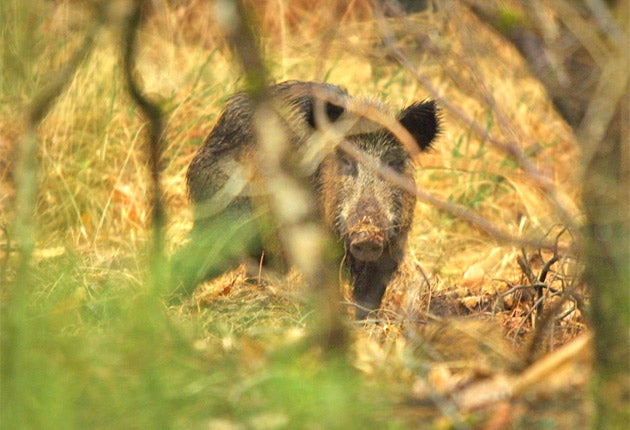Fears rise over French 'killer seaweed' that left 15 wild boar dead
Studies have concluded that the seaweed, although present naturally, has been increased by nitrogen flowing into estuaries from intensive pig farms

Your support helps us to tell the story
From reproductive rights to climate change to Big Tech, The Independent is on the ground when the story is developing. Whether it's investigating the financials of Elon Musk's pro-Trump PAC or producing our latest documentary, 'The A Word', which shines a light on the American women fighting for reproductive rights, we know how important it is to parse out the facts from the messaging.
At such a critical moment in US history, we need reporters on the ground. Your donation allows us to keep sending journalists to speak to both sides of the story.
The Independent is trusted by Americans across the entire political spectrum. And unlike many other quality news outlets, we choose not to lock Americans out of our reporting and analysis with paywalls. We believe quality journalism should be available to everyone, paid for by those who can afford it.
Your support makes all the difference.The carcasses of five wild boar were discovered on a beach in Brittany yesterday, reigniting fears that "killer" seaweed, generated by farm pollution could pose a threat to human health on the north Breton coast this summer.
The five dead animals bring to a total of 15 the number of dead boar found on the same beach in Saint-Brieuc bay over the past three weeks.
The collapse, and death, of a horse on a nearby beach two summers ago provoked an outcry in France about the failure of the government to tackle a "green tide" of seaweed, which has choked north Breton beaches for more than a decade.
Investigations are also continuing into the death two years ago of a man employed to cart away the weed, which generates toxic fumes of hydrogen sulphide when it rots.
Studies have concluded that the weed, though present naturally, has been prompted to swell to gigantic proportions by the nitrogen flowing into estuaries from intensive pig and cereals farms in central Brittany.
The five dead boar, two adults and three babies, were found lying on the mud of a river estuary at Morieux, near Saint-Brieuc yesterday morning. Eight dead animals were found nearby on Sunday and two others on 7 July.
"We are very worried. How could we be anything other than worried when animals are being found dead?" said the mayor of Morieux, Jean-Pierre Briens.
Environmental campaigners were furious when the deaths of the first two wild boar were dismissed earlier this month as an accident. The animals were said by authorities to have died from swallowing too much mud while grazing at low tide. The beach was, nonetheless, closed. A more elaborate post-mortem examination has been ordered for all the animals found on Sunday and yesterday.
There have been battles for more than a decade between Paris, Brussels, Breton farmers and environmental campaigners about the thick banks of seaweed that invade parts of the north Breton coast each summer.
Despite EU fines, the French government has preferred to tackle the problem by employing people to cart away the weed, rather than imposing severe restrictions on pig effluent and the use of nitrogen fertilisers.
When the weed rots, it emits hydrogen sulphide (H2S), a colourless and highly poisonous gas which smells of rotten eggs.
Local people have been protesting for years that the weed has ruined many of the once beautiful coves and beaches of the north Breton coast.
Ecological campaigners say that the weed is also potentially highly dangerous to animals and humans. Small pockets of hydrogen sulphide can become trapped in the beach mud, they say, and escape when disturbed, with fatal consequences.
The horse that died on a beach in 2009 was at first said by the authorities to have become stuck in the tidal mud and drowned. An autopsy proved that it had died from hydrogen sulphide poisoning.
André Olivro, president of a local protest group, said yesterday: "Next time we are scared, it will be a child."
Join our commenting forum
Join thought-provoking conversations, follow other Independent readers and see their replies
Comments